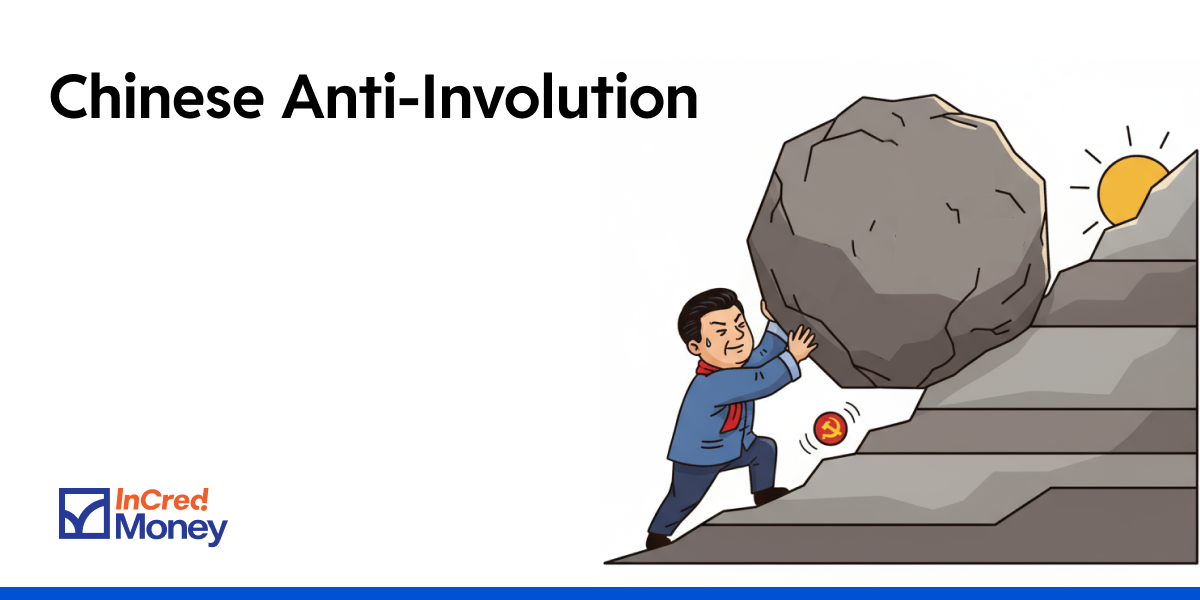In Greek mythology, Sisyphus was condemned to roll a boulder up a hill, only to watch it tumble back down, forever.
It’s hard not to think of Sisyphus when looking at China today. Only here, the boulder isn’t stone, it’s electric vehicles, lithium batteries, and e-commerce platforms.
The Chinese call it Neijuan, or Involution.
It’s the race to the bottom: companies cutting prices, adding capacity, and working harder just to survive, without actually growing the overall pie of profits or productivity.
BYD: The ‘Tesla Killer’ Feeling the Heat
Take BYD. Once hailed as Tesla’s great rival, it outsold Tesla in 2024, delivering nearly 4 million cars. But by mid-2025, the story had changed:
1. Profits plunged nearly 30% year-on-year in the June quarter
2. Market value shrank by $45 billion, from a peak of around $100 billion
Why? A brutal price war.
To defend market share against competitors like Geely Motors, NIO and many others, BYD kept slashing prices. Sales volumes rose, but margins collapsed.
How Involution Has Shaped China
This hyper-competition hasn’t just hit companies. It has reshaped China’s economy and society:
1. Deflation & profit squeeze: Fierce price wars eroded corporate margins, leaving less for innovation and quality upgrades.
2. Overcapacity: Too many factories, too little demand—resulting in idle plants and wasted capital.
3. Youth burnout: The pressure cooker of schools and jobs pushed young people toward the “lie flat” movement, choosing rest over relentless grind.
4. Distorted investments: Local governments chasing GDP targets fueled redundant projects in EVs, solar, AI, and data centers.
5. Global ripple effects: Ultra-cheap exports strained foreign producers, triggered trade disputes, and weakened global demand.
Why Beijing Is Changing Course
China’s old growth model, cheap labor and massive exports, has run its course.
With slowing growth, disillusioned youth, and shrinking corporate profits, Beijing realized it needs:
1. Better quality of life for workers
2. Innovation-driven growth instead of pure scale
3. A stronger domestic economy less reliant on exports
China is rolling out an “anti-involution” strategy in 2025.
What Beijing Is Doing
The government is moving on multiple fronts:
1. Cracking down on price wars: New rules ban selling below cost, algorithm-driven price cuts, and unfair price discrimination.
2. Forcing out excess capacity: Outdated plants and duplicate projects must exit the market.
3. Pushing consolidation: Fewer, stronger players in EVs, solar, and other sectors.
4. Stimulating demand: Consumer rebates, subsidies, cheaper loans, and infrastructure spending aim to revive consumption.
5. Curbing reckless local subsidies: No more blind provincial competition to boost short-term GDP.
Having said that, the Government will push for gradual change rather than radical reforms so that there is less impact on employment and consumer confidence. Check out this video about the Chinese Anti-Involution Campaign.
Global Supply Chain Impacts
China’s retreat from price wars and overcapacity could finally bring stability to global trade.
With fewer ultra-cheap exports flooding markets, prices may become steadier, even if slightly higher than before.
As inefficient factories shut down, other countries could capture market share, reducing China’s dominance.
The shift could also lower volatility in supply chains, making it easier for businesses to plan ahead, while easing some of the trade tensions that cheap Chinese exports had long fueled.
India’s Big Opportunity
For years, Chinese dumping crushed Indian industries—from solar panels and textiles to toys and electronics. Imports surged, but local firms struggled to scale or innovate.
Now space may open up. Experts say that sectors like Electronics, EV components, Ssolar panels, and precision manufacturing could benefit from this anti-involution drive.
But this window won’t stay open forever. India must move fast, fixing bottlenecks in infrastructure, approvals, and logistics, while raising quality standards.
Competing on cost alone won’t cut it; India will have to deliver on speed, reliability, and innovation.
If you enjoyed this newsletter, feel free to share it with your friends and family using the link below.
Also, if you have any topics that you would like us to cover or any other feedback, do write to us at connect@incredmoney.com
Till the next time,
Vijay
CEO – InCred Money





